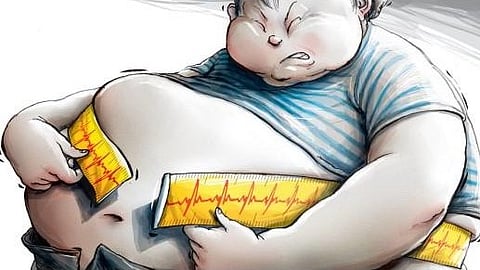

NEW DELHI: The increasing consumption of processed foods, reduced physical activity, and lifestyle changes have further intensified the growing obesity crisis in India and which is affecting both urban and rural populations, the centre informed the Rajya Sabha on Tuesday.
In a written reply, Minister of State of Health and Family Affairs, Prataprao Jadhav, said unhealthy diets, sedentary lifestyles and environmental factors are key contributors to the rising prevalence of obesity.
The minister said the government of India promotes activities for healthy living under National Programme for Prevention and Control of Non-Communicable Diseases (NP-NCD).
He said the centre has taken several steps, which includes promotion of wellness activities through Ayushman Aarogya Mandir (AAM); yoga related activities by the Ministry of AYUSH and organising health melas at each AAM to generate awareness about healthy lifestyles.
He also said that financial support is provided to states and Union Territories for awareness generation activities (IEC) through print, electronic and social media.
To a question from Trinamool Congress, Sagarika Ghose, whether government has taken any steps to counter the rising cases of obesity among Indian citizens, the minister said, “In order to counter obesity in the country, Food Safety and Standards authority of India (FSSAI) has notified Food Safety and Standards (Labelling and Display) Regulations, 2020 prescribing requirement for labelling of packaged food.”
The Regulations require display of nutrients and their contribution to Recommended Daily Allowance (RDA) in percentage at the back of the pack as Nutritional Information to enable consumers to make informed choices.
Jadhav said that it is mandatory for Food Business Operators (FBOs) to label the food package in accordance with these Regulations.
FSSAI has also notified the Food Safety and Standards (Safe food and balanced diets for children in school) Regulations, 2020.
These regulations place a restriction on sale of foods High in Fat, Salt and Sugar (HFSS) to school children in school canteens/mess premises/hostel kitchens or within 50 meters of the school campus and also a restriction on advertisement of such products in these areas.
The minister said the regulations aim to encourage schools to adopt a comprehensive program for promoting Safe food and healthy diets amongst school children and to convert school campuses into Eat Right School focusing on safe and healthy food, local and seasonal food and no food waste as per specified benchmarks.
Moreover, FSSAI has systematically reduced trans-fat content in a phased manner, achieving a ≤2% cap on industrially produced trans fats by 2022.
He also said that FSSAI has launched the Eat Right Movement to engage and enable citizens including children to improve their health and wellbeing by eating healthy and nutritious foods and creating public awareness that regular and excessive consumption of foods high in salt, sugar and fat leads to obesity.
Under Eat Right India initiatives, 2209 Eat Right Campuses, 194 Eat Right Street Food Hub, 213 Eat Right Stations and 2025 Eat Right School have been certified to ensure healthy, hygiene and safe food practices.
"Till now, more than 400 Eat Right Melas/Eat Right Millets Melas have been conducted throughout the country to generate awareness of healthier food options," he added.
The minister also said the Union Health Ministry implements Reproductive, Maternal, New born, Child, Adolescent Health and Nutrition (RMNCAH+N) strategy in a life cycle approach under National Health Mission (NHM), which includes interventions to address nutrition among children including obesity across the country.